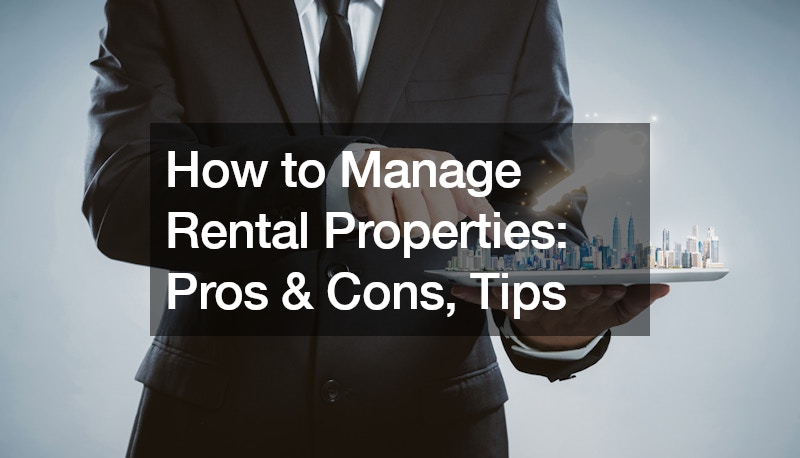Rental property management can be a lucrative venture, offering investors the opportunity to generate passive income and build wealth over time. However, like any investment opportunity, it comes with its own set of challenges and considerations. In this comprehensive guide, we’ll explore the pros and cons of managing rental properties, along with valuable tips for success in the field.
Understanding Rental Property Management
Before delving into the specifics, it’s crucial to grasp the essence of rental property management. At its core, rental property management involves overseeing residential or commercial properties leased to tenants. This entails a range of responsibilities, including property maintenance, tenant relations, rent collection, and financial management.
The Pros of Rental Property Management
1. Passive Income: One of the primary advantages of owning rental properties is the potential for generating passive income. With tenants paying rent regularly, property owners can enjoy a steady stream of cash flow, providing financial stability and long-term wealth accumulation.
2. Appreciation: Real estate properties have historically appreciated over time, making them valuable assets for investors. As property values increase, owners can benefit from capital appreciation, allowing them to build equity and increase their net worth.
3. Tax Benefits: Rental property owners are entitled to various tax deductions and benefits, including mortgage interest deductions, property depreciation, and operating expenses. These tax incentives can significantly reduce the property’s taxable income, resulting in substantial savings for investors.
4. Portfolio Diversification: Investing in rental properties enables diversification of investment portfolios, reducing overall risk. Unlike stocks or bonds, real estate investments tend to have lower correlation with other asset classes, providing a hedge against market volatility.
The Cons of Rental Property Management
1. Time and Effort: Managing rental properties requires significant time and effort, especially for hands-on landlords. From property maintenance and repairs to tenant screenings and lease negotiations, the responsibilities can be time-consuming and demanding.
2. Tenant Issues: Dealing with tenants can be challenging, particularly in cases of late payments, property damage, or lease violations. Resolving tenant disputes and addressing their concerns effectively requires patience, communication skills, and sometimes legal intervention.
3. Vacancies and Cash Flow: Vacancies can pose a significant risk to rental property owners, leading to loss of rental income and increased carrying costs. Maintaining consistent occupancy levels and minimizing vacancies are essential for ensuring positive cash flow and profitability.
4. Market Volatility: The real estate market is subject to fluctuations, impacting property values, rental rates, and demand for rental units. Economic downturns or changes in market conditions can affect the profitability of rental properties, requiring owners to adapt their strategies accordingly.
Tips for Successful Rental Property Management
1. Treat it as a Business: Approach rental property management with a business mindset, emphasizing professionalism, organization, and strategic planning. Develop clear goals, implement effective systems, and track financial performance to maximize profitability.
2. Offer Quality Properties: Invest in well-maintained properties in desirable locations to attract high-quality tenants and command competitive rental rates. Regular maintenance and upgrades can enhance property value and tenant satisfaction.
3. Screen Tenants Thoroughly: Conduct comprehensive tenant screenings, including background checks, credit evaluations, and rental history verifications. Selecting reliable tenants reduces the risk of rental defaults, property damage, and eviction proceedings.
4. Enforce Lease Agreements: Establish clear lease agreements outlining tenant responsibilities, rent payment terms, and property rules. Consistently enforce lease provisions and address lease violations promptly to maintain order and compliance.
5. Maintain Communication: Foster open communication with tenants to address concerns, resolve issues, and build positive relationships. Promptly respond to inquiries and maintenance requests to demonstrate professionalism and commitment to tenant satisfaction.
6. Stay Informed: Keep abreast of local rental market trends, regulations, and best practices in rental property management. Networking with industry professionals, attending seminars, and joining landlord associations can provide valuable insights and resources.
7. Outsource when Necessary: Consider outsourcing certain tasks, such as property maintenance, accounting, or tenant screenings, to reputable professionals or property management companies. Outsourcing allows landlords to focus on core business activities and mitigate workload burdens.
Financial Management Tips for Rental Property Owners
Effective financial management is crucial for rental property owners to ensure profitability and long-term success. Here are some essential tips to optimize your financial strategies:
Budgeting: Start by creating a comprehensive budget that includes all income and expenses related to your rental property. Factor in mortgage payments, property taxes, insurance, maintenance costs, utilities, and vacancies. Having a clear understanding of your financial obligations will help you make informed decisions and avoid cash flow problems.
Rent Collection: Implement a reliable rent collection system to ensure timely payments from tenants. Consider offering convenient payment options such as online payments or automatic bank transfers to streamline the process. Consistent rent collection is essential for maintaining steady cash flow and covering property expenses.
Expense Tracking: Keep meticulous records of all expenses associated with your rental property. Use accounting software or spreadsheets to track maintenance costs, repairs, property management fees, and other expenditures. Maintaining accurate financial records will simplify tax preparation and help you identify areas where you can reduce costs.
Conclusion
While rental property management offers numerous benefits and opportunities for investors, it also entails challenges and responsibilities. By understanding the pros and cons of managing rental properties and implementing effective strategies, landlords can navigate the complexities of the rental market successfully. With careful planning, diligence, and commitment to excellence, rental property management can be a rewarding and profitable endeavor.
.










